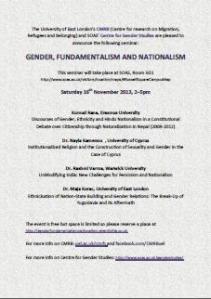Undocumented Migrants, Ethnic Enclaves and Networks: Opportunities, traps or class-based constructs
UndocNet
End of project conference
The Graduate Centre, London Metropolitan University, N7 8DB
9:30 AM to 6 PM, 6th December 2013
Register now
UndocNet, a two-year project funded by the Economic and Social Research Council, will be holding its end of research project conference in London on Friday 6 December 2013. UndocNet has been exploring the labour market experiences and aspirations of 55 irregular migrants in London from three countries of origin – Bangladesh, China and Turkey (including Kurds) – and 24 minority ethnic entrepreneurs employing people from these three groups. The context of the research has been the economic downturn, increasingly restrictive immigration controls, raids on businesses suspected of employing people without correct documentation and the deportation of irregular migrants. Within this contemporary context the project has been concerned with understanding decisions to use or not to use social capital in the form of co-ethnic networks in the search for work and for workers, in or out of ethnic enclaves, from the perspectives of workers and their employers. The research has investigated the ways in which migrants and their employers use their social networks and other resources in relation to work and the ways in which working relationships operate within frameworks of ethnicity, class and gender (www.UndocNet.org)
Findings from the conference will be presented by the research team:
Professor Alice Bloch,University of Manchester
Professor Sonia McKay, London Metropolitan University
Dr Leena Kumarappan, London Metropolitan University
Plenary lectures:
Professor Bernard Ryan, Law School, University of Leicester:
Irregular Migrants: Legal Dilemmas
Dr Hannah Lewis, School of Geography, University of Leeds:
The increasingly hostile environment: discomfort as a policy goal
Professor Louise Ryan, Social Policy Research Centre, Middlesex University:
Making Connections: re-appraising social networks, family and social capital
Professor Bridget Anderson, COMPAS, University of Oxford:
“Illegal immigrants are not criminals!” Aren’t they?
PAPER PRESENTATIONS IN THE MORNING AND AFTERNOON
All welcome to a drinks reception after the conference
Registration is free but places are limited
Registration deadline: 15 November 2013 (Email: L.Kumarappan@londonmet.ac.uk)
FURTHER DETAILS WILL BE SENT FOLLOWING REGISTRATION



You must be logged in to post a comment.